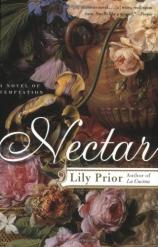Reading Group Guide
Discussion Questions
Nectar: A Novel of Temptation

1. Why do you think the author withheld the name of the beekeeper from the reader? Do you think this is significant? How does his passion for Ramona differ from all the others?
2. Do you think that Ramona is using her attractiveness to distinguish her standing at the estate or do you think she is primarily driven by lust and vanity? Do you find Ramona's antics amusing or disturbing, and if so, why?
3. After the beekeeper's suicide, do you think the villagers treat Ramona as she deserves or is their reaction excessive and motivated by something less obvious? Did their behavior following the disappearance of the beekeeper's body make Ramona feel remorseful or even more confident than ever?
4. Shortly after their arrival in Napoli, Ramona asks Rupinello the humpback to read her future. The tarot cards, the crystal ball, and even Ramona's own palm revealed "torment, misery, madness, despair, death." Why does he lie to Ramona? Do you think in the end his predictions were accurate? Or, did Ramona ultimately elude her destiny?
5. When Ramona lost her scent, "not a single person noticed her. It was as though Ramona Drottoveo did not even exist. . . . She felt suddenly small and scared and insignificant." How do people, especially men, regard Ramona once her bewitching odor vanishes? Does her loss affect her behavior? Does she deserve her comeuppance? What do you think this says about the nature of women's sex appeal and how it shapes their psyche?
6. On her arduous journey back to the estate, Ramona abandons her rapidly growing baby in a ditch, then returns to it. "She didn't understand why her body changed direction, why her legs began to carry her back." Why do you think she returned? Did it prove to be a wise decision for Ramona? What was more powerful in that instance -- Ramona's maternal instinct or the baby's cunning?
7. Ramona is remarkably attentive and faithful to her third husband, the Signor. "Ramona Drottoveo was good for him -- even the most bitter of the servants had to admit that." Do you think that the loss of her scent softened Ramona's heart? Or, did it make her feel more alone and vulnerable? Was she at any point aware that her strength as a woman had evaporated along with her scent? If so, when?
8. When her adoring nurse Milvia died, Blandina gleefully went riding. Was this gesture consistent with her character? While Ramona cared for the Signor, Blandina took advantage of all the young signori, who beat a path to her door. Compare Blandina to Ramona. In what ways do they differ? Would you agree that Blandina is truly her "mother's daughter"? Do you believe that an excess of natural gifts can lead to heartlessness?
9. Nectar concludes with the pig-keeper, Stiliano Mamiliano, proposing to Ramona. Do you believe that she would accept? What lessons (if any) do you think Ramona has learned? Why do you think Lily Prior chose to conclude the book with this scene?
10. Do you think Lily Prior intends the magical "smell" in Nectar, passed on from mother to daughter, to be interpreted metaphorically? Or is this a ribald tale, with supernatural elements and superstition reflecting the narrow worldview of its tragicomic characters?
11. Would you describe Nectar as a romantic novel? A sensual one? A comedy? Compare and contrast Nectar with Lily Prior's first novel, La Cucina. How does the Italian culture and tradition determine the outlook and lives of Ramona and Rosa Fiore, the main character of La Cucina? Both stories are set against the lush and sensual backdrop of the Italian countryside, yet the tone is different. Which novel is more optimistic in its outlook on women? If both books were made into movies, who would play Ramona? Or Rosa Fiore?
Nectar: A Novel of Temptation
- Publication Date: July 8, 2003
- Paperback: 272 pages
- Publisher: Harper Perennial
- ISBN-10: 0060936827
- ISBN-13: 9780060936822







